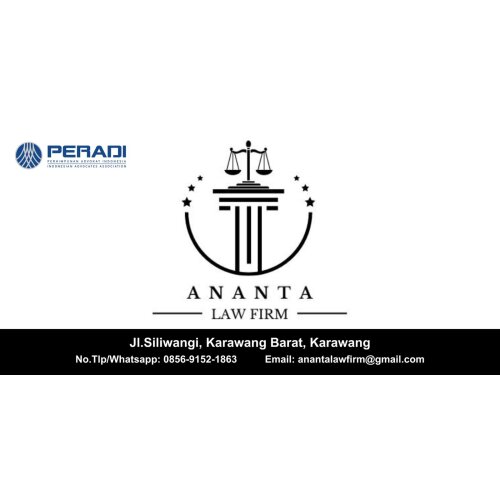Best Faith-Based Law Lawyers in Karawang
Share your needs with us, get contacted by law firms.
Free. Takes 2 min.
List of the best lawyers in Karawang, Indonesia
About Faith-Based Law in Karawang, Indonesia
Faith-Based Law, often referred to as religious or Sharia law, plays a significant role in the legal landscape of Indonesia, including Karawang. In this region, Faith-Based Law is often intertwined with the national legal system, reflecting the country's Islamic traditions and cultural values. This form of law primarily deals with personal matters such as marriage, divorce, inheritance, and religious practices. The local courts may consider these laws when adjudicating cases that pertain to Muslim residents, allowing individuals to resolve disputes in accordance with their religious beliefs.
Why You May Need a Lawyer
Navigating Faith-Based Law can be complex, particularly when it intersects with Indonesia’s civil legal system. Common situations where one might require legal assistance include:
- Marriage and Divorce: Ensuring that marital procedures comply with both civil and religious laws.
- Inheritance Disputes: Settling disagreements over property distribution according to Sharia principles.
- Business Transactions: For businesses or partnerships involving contracts that need to comply with Islamic principles.
- Religious Rights: Protecting the rights and practices as per religious beliefs, which might involve negotiation with governmental bodies.
- Legal Representation: In religious courts, where knowledge of both Indonesian civil law and local religious ordinances is crucial.
Local Laws Overview
In Karawang, Faith-Based Law is primarily relevant to the Muslim population, as it reflects aspects of Sharia. Some key aspects include:
- Marriage Contracts: Legally recognized under civil law, but they must also meet specific religious criteria for validity.
- Inheritance Rules: The division of property is guided by Islamic principles, which may differ from civil inheritance laws.
- Religious Courts: These may handle disputes related to marriage, divorce, and inheritance for Muslim citizens, operating alongside national courts.
- Business Ethics: Business dealings and financial transactions must comply with ethical guidelines to avoid riba (usury) and ensure fairness.
Frequently Asked Questions
How does Faith-Based Law affect marriage contracts in Karawang?
Marriage contracts must align with Islamic guidelines, which may require additional religious documentation alongside civil registration.
Can non-Muslims be affected by Faith-Based Law in Karawang?
Faith-Based Law is primarily applied to Muslims; however, it can occasionally intersect with civil legal matters that involve mixed-faith entities.
What are the inheritance laws under Faith-Based Law?
Inheritance is typically divided based on Islamic guidelines, which allocate shares to family members in a manner different from civil law allocations.
How are faith-based financial disputes resolved?
Such disputes are often resolved through religious courts, bringing in Sharia principles to ensure that agreements adhere to Islamic ethics.
What role does a religious court play in Karawang?
Religious courts in Karawang handle cases specific to family law and other faith-based legal matters, serving the region's Muslim population.
Is it necessary to have a lawyer for faith-based legal issues?
While not always necessary, a lawyer's expertise can be invaluable for navigating the complexities of cases where civil and religious laws intersect.
How are child custody disputes handled under Faith-Based Law?
Child custody is determined with consideration for both civil rights and Islamic moral standards, focusing on the best interests of the child.
Are there specific legal firms specializing in Faith-Based Law in Karawang?
Yes, several legal firms specialize in this field, providing expertise in both civil and religious legal matters pertinent to the region.
Can Faith-Based Law influence employment contracts?
Yes, particularly in businesses owned by Muslims or within an Islamic framework, where contracts may need to comply with religious tenets.
What should I do if I have a legal issue involving Faith-Based Law?
Seek legal counsel from a professional versed in both local and religious law to receive tailored advice applicable to your situation.
Additional Resources
For those seeking further assistance, consider consulting:
- The Ministry of Religious Affairs: Offers guidance on religious legal matters.
- Local Religious Courts in Karawang: Provide legal services specific to Faith-Based Law cases.
- Legal Aid offices: Offer free or low-cost legal assistance to those in need.
- Islamic Organizations: Such as Nahdlatul Ulama or Muhammadiyah, which provide community support and advice on religious legal matters.
Next Steps
If you require legal assistance in the field of Faith-Based Law, consider taking the following steps:
- Identify the legal nature of your issue to determine the applicable laws.
- Consult with a qualified lawyer experienced in both Indonesian and Sharia law.
- Gather necessary documents and evidence related to your case.
- Contact relevant authorities or religious courts if additional action is needed.
- Follow the legal advice provided to ensure compliance with both civil and Faith-Based legal standards.
Lawzana helps you find the best lawyers and law firms in Karawang through a curated and pre-screened list of qualified legal professionals. Our platform offers rankings and detailed profiles of attorneys and law firms, allowing you to compare based on practice areas, including Faith-Based Law, experience, and client feedback.
Each profile includes a description of the firm's areas of practice, client reviews, team members and partners, year of establishment, spoken languages, office locations, contact information, social media presence, and any published articles or resources. Most firms on our platform speak English and are experienced in both local and international legal matters.
Get a quote from top-rated law firms in Karawang, Indonesia — quickly, securely, and without unnecessary hassle.
Disclaimer:
The information provided on this page is for general informational purposes only and does not constitute legal advice. While we strive to ensure the accuracy and relevance of the content, legal information may change over time, and interpretations of the law can vary. You should always consult with a qualified legal professional for advice specific to your situation.
We disclaim all liability for actions taken or not taken based on the content of this page. If you believe any information is incorrect or outdated, please contact us, and we will review and update it where appropriate.








